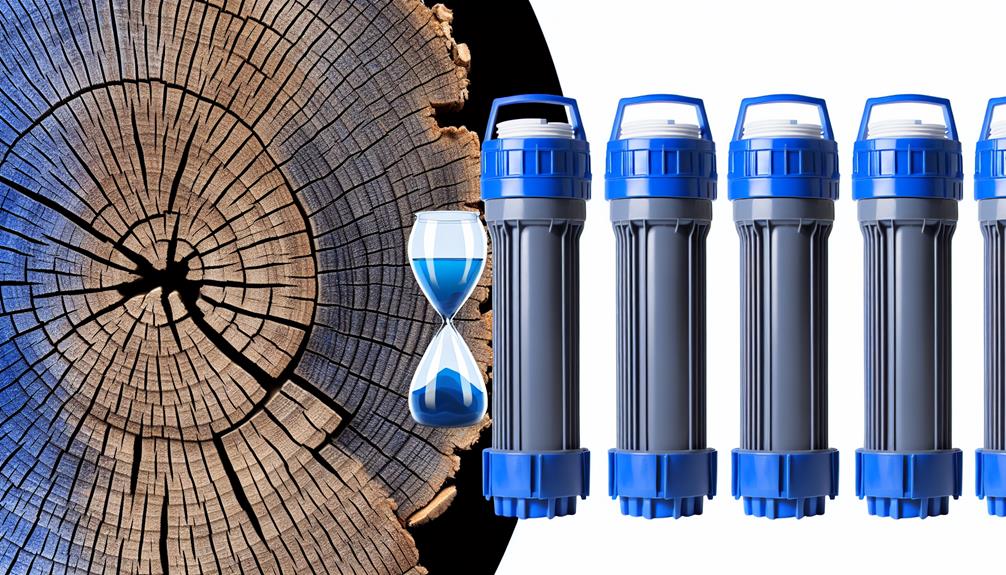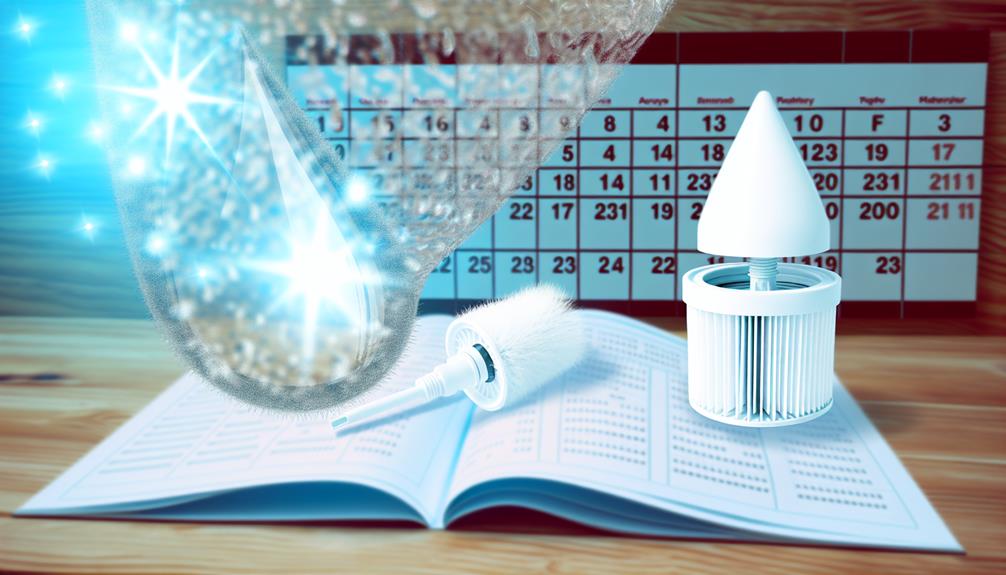Just as Achilles' heel was his singular point of vulnerability, your water filter too has its critical points that can determine its longevity.
You've invested in a water filtration system to ensure your water is clean, but are you taking the necessary steps to maximize its lifespan? Let's face it, you'd rather not spend extra money on frequent replacements or deal with the hassle of unexpected breakdowns.
By following a few practical tips, you can significantly extend the life of your filter and maintain the quality of your water.
Now, you might be aware of the basics, like timely cartridge changes, but there are several lesser-known strategies that can make a world of difference. Stick around, and you'll uncover the secrets to keeping your water filter functioning at its peak for years to come.
Schedule Regular Replacements
To ensure your water filter continues to function at its peak, you must adhere to the manufacturer's recommended schedule for filter replacements. This regular maintenance is a non-negotiable aspect of Water Filter Maintenance. Typically, replace filters every six months to maintain the system's optimal performance. Filters need replacement every six months because, over time, they accumulate contaminants that can significantly decrease filtration capacity, leading to poor water quality.
Adhering to these guidelines for filter replacement isn't just about immediate results; it's about ensuring the longevity of your entire water filtration system. Neglecting this maintenance routine could result in impurities reaching your tap, which is precisely what you're trying to avoid.
Follow the manufacturers' specifications diligently; they're designed to ensure that your filter operates efficiently for as long as possible.
Monitor Water Pressure
Regular monitoring of your water filter system's pressure is crucial for maintaining its efficiency and preventing potential damage. Pressure plays a significant role in the performance of water filtration systems, and not keeping an eye on it can lead to a host of issues. Low water pressure can cause your system to strain unnecessarily, while high pressure can result in leaks or even system damage.
Here's what you need to keep in mind:
- Regularly check pressure levels using a gauge to ensure they remain within the recommended range.
- Be alert for signs of low water pressure, which can indicate clogged filters in need of replacement.
- Install a pressure regulator if fluctuations are common, to maintain a consistent flow and protect the system.
- Consult with professionals for maintenance or adjustments to prevent complications that could affect the system's longevity.
Perform Routine Inspections
Conducting systematic inspections of your water filter system's components plays a pivotal role in ensuring its continuous and efficient operation. Regular maintenance is crucial to prolong the lifespan of your filter. You should thoroughly inspect all elements of the system to detect any signs of wear, damage, or corrosion. Pay particular attention to the filter cartridges; they're at the heart of your water filter system's performance.
Check for leaks, loose connections, and any irregularities that could compromise the integrity of the system. It's not just about spotting problems; it's about preventive care. Regular cleaning and prompt attention to even minor issues can save you from more significant troubles down the line.
Remember to clean or replace filter cartridges as needed, typically every six months, to maintain optimal filtration. This frequency can vary based on your specific water filter system, so always check the manufacturer's recommendations. Monitoring water pressure and flow is also indicative of the system's health; fluctuations may signal clogs or other malfunctions.
Clean Filter Components
To safeguard the efficacy of your water filtration system, it's essential you regularly clean its components. Neglecting this step can lead to filter clogs, which compromise water quality and diminish the filter's performance.
Adhering to a maintenance schedule for cleaning and replacing parts is crucial in preventing contamination and ensuring the longevity of your system.
Regular Component Maintenance
Ensure you clean or replace your water filter cartridges as necessary to preserve their filtration efficiency. Adhering to best practices to ensure the extended lifespan of your water filtration system is essential. Here are four crucial aspects of maintaining optimal performance:
- Regularly inspect and sanitize your filter media to prevent mold and bacteria buildup.
- Tighten connections to avoid leaks that compromise your system's integrity.
- Follow the manufacturer's instructions for specific cleaning and replacing procedures.
- Consider additional filters for targeted contaminant removal, enhancing taste and longevity.
Preventing Filter Clogs
Maintaining a clog-free water filter system requires diligent cleaning of filter components to ensure peak performance and filtration quality. Impurities can accumulate in your filter, causing it to become clogged and less effective at removing contaminants.
To extend the lifespan of your filter and guarantee safe drinking water, regularly clean or replace filter cartridges as recommended by the manufacturer. Inspect the filter housing and tighten connections to prevent leaks, which can lead to contaminant bypass or system damage.
Sanitizing filters is also crucial to prevent premature wear and the growth of mold or bacteria. For specific water issues, consider additional filters, but always adhere to the prescribed maintenance and cleaning guidelines to maintain optimal performance.
Address Water Quality
Addressing water quality is pivotal for the optimal performance and longevity of your water filter system. Your system ensures clean and safe drinking water by eliminating contaminants that pose potential health risks. However, the filtration process can be compromised if the water quality entering the system is poor. Maintaining your water filter not only secures pure water but also plays a significant role in extending the lifespan of the filter.
- Water filters remove harmful pathogens and pollutants, but their efficiency diminishes with lower quality input water.
- Sediments, heavy metals, and high mineral content can cause filter clogs, reducing efficacy and safe water output.
Regular testing of water quality helps in identifying issues that may hinder the performance of your filtration system.
- Addressing water quality proactively by installing pre-filtration units can prevent premature wear and tear on your primary filter.
Protect From Temperature Extremes
To safeguard your water filter's integrity and performance, store its components away from environments where extreme temperatures prevail. Extreme temperatures can affect the filters' efficiency and potentially shorten their lifespan, leading to costly repairs. It's essential to maintain water filtration systems in optimal condition to ensure the provision of safe water and uphold the quality of the water you consume.
Insulating filter components is a practical approach to prevent damaging them, especially during seasons when temperatures can drop drastically or soar. By keeping the system in a temperature-controlled environment, you protect vital parts from the adverse effects of extreme cold or heat. For instance, in cold climates, insulating pipes can guard against freezing, which would otherwise compromise the filter's functionality and necessitate expensive servicing.
Be mindful that correct storage and maintenance not only preserve the filter's structural elements but also maintain its efficacy. This diligence helps you avoid interruptions in access to proper water due to a malfunctioning system. By taking these proactive measures, you can ensure that your water filter continues to operate at its best, providing you with a reliable source of clean water without unwarranted disruptions or additional expenses.
Avoid Unnecessary Filter Stress
Regular inspections and proper tightening of your water filter's connections are crucial to stave off leaks and undue stress on the system. A well-maintained water filter is essential for maintaining water quality and ensuring optimal performance. To avoid damaging filters and prevent premature wear, follow these tips:
- Keep an Eye on Pressure: Ensure your water pressure is within the recommended range to maintain water filtration system efficiency and avoid unnecessary strain.
- Shield from Extremes: Protect your filter from extreme temperatures that could compromise its integrity and shorten its life.
- Regular Clean-Up: Clean the filter body regularly to prevent sediment buildup, which is crucial for the filter to function correctly.
- Say No to Hot Water: Using hot water can be detrimental to the filter cartridges, reducing their effectiveness and longevity.
Sanitize System Periodically
Why should you sanitize your water filter system periodically? Regular sanitization is key to preventing the proliferation of mold and bacteria within your filtration unit, ensuring both the longevity of your system and the safety of your drinking water.
The Importance of Regular maintenance of your water filtration system can't be overstated. Sanitizing your system plays a pivotal role in the effectiveness of your water filter. By removing contaminants that may affect performance, you're not only extending the life of your filters but also safeguarding your health. Whether you're choosing a water filter with an activated carbon, Carbon Filter, Sediment Filter, or a reverse osmosis system, all require periodic cleaning to function optimally.
Here are some Tips for Cleaning your system. You should sanitize your filters regularly, following the manufacturer's instructions. Typically, this involves a thorough rinse with a sanitizing solution, which should be flushed through the system to eliminate any harmful impurities. Depending on the type of filter, you might also need to disassemble parts of your filtration system for a more detailed clean.
Handle Filters With Care
After ensuring your water filtration system is sanitized, it's equally crucial to handle filters with care to maintain their integrity and functionality. You must understand the importance of maintaining a water filtration system to ensure you consistently have access to clean, filtered water. Correct handling isn't just about prolonging the life of your filter; it's about safeguarding your investment in health and well-being.
- Prevent Damage: Handle your filter gently to protect its delicate components and extend its service life.
- Safe Storage: Always store your filters in a secure, dry environment to avoid any physical harm.
- Secure Transportation: When moving your filter, make sure it's well-packaged to prevent jostling and impacts.
- Mindful Maintenance: Clean your filters with care to avoid disrupting the filtration media.
Seek Professional Maintenance
To maximize your water filter's efficiency and longevity, enlist the expertise of certified technicians for annual professional maintenance. This step plays a vital role in maintaining the complex components of your system. Professional maintenance can identify potential issues before they escalate into major problems, significantly impacting your filter's performance and lifespan.
By adhering to the manufacturer's guidelines and making sure you seek professional help, you ensure that your system operates at peak efficiency. This not only provides you with clean, safe, and healthy drinking water but also preserves the benefits for years to come. Regular professional checks safeguard the health and well-being of your family by ensuring optimal water quality.
Don't overlook the importance of professional maintenance. It's an investment that protects against costly repairs or replacements down the line. By maintaining your filter through certified services, you comply with any relevant regulations and maintain safety standards.
Educate on Proper Usage
While professional maintenance is crucial for your water filter's health, understanding and adhering to the manufacturer's recommended usage guidelines is equally imperative to ensure its longevity and efficiency. Your water filter is your fortress, safeguarding your household from contaminants, but it requires your knowledgeable intervention to function at its best.
- Respect the flow rate: Pushing water through faster than the designated flow rate can lead to less effective removing impurities, diminishing the health benefits of clean water.
- Change filters on time: Waiting too long to replace filters can cause a buildup of contaminants. Replace every six months or as per the manufacturer's instructions to maintain peak performance.
- Avoid premature wear: Using filters beyond their capacity can lead to wear and tear that isn't immediately visible but compromises the water filtration process.
- Regularly clean filters: Even if it's not time to replace them, cleaning filters to prevent the accumulation of debris is crucial to your system's health.

